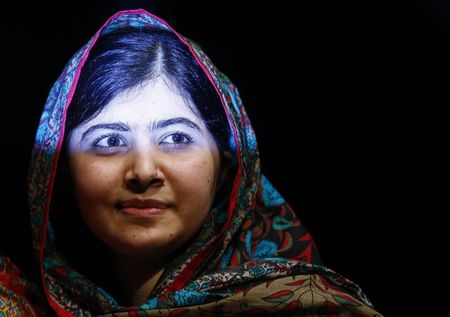By Mehreen Zahra-Malik
MINGORA Pakistan (Reuters) - In the hometown of Nobel prize winner Malala Yousafzai, the students at the government-run Girls' High School Mingora sit cross-legged on sacks and sheets on the floor because there is not enough furniture.
The windows are broken, the walls dirty, and the teachers angry. Their anger is not directed at Malala herself, they say, but at a world that lavishes attention on her while ignoring the neglect and violence in her home of Swat Valley.
"It's all Malala, Malala, Malala," complained mathematics teacher Saima Khan. "There are hundreds of people who have sacrificed everything and lost everything. No one has given them anything."
At a cake-cutting ceremony on Saturday, politicians carrying posters of Malala jostled for space with civil society activists before marching to the press club along potholed streets piled high with rubbish.
Many residents looked askance at the procession, pointing out that even as leaders paid lip service to Malala's education drive, they were allowing schools in her hometown to crumble under government neglect and continued military occupation.
"This obviously makes people unhappy. If the government did its job, people wouldn't have to hate Malala. They feel abandoned," said Ahmed Shah, Malala's former teacher and a close friend of her father.
"People feel that Malala got attention all over the world but Swat got no attention even in Pakistan."
Provincial legislator Fazle Hakim said he was big fan of Malala's education message, but conceded the government had not built a single new school since coming to power a year ago.
"People are upset at the lack of work," he admitted.
Building new schools is especially urgent since the troops that arrived in 2009 continue to use many schools as barracks and bases. Hakim said around 40 percent of schools in Swat Valley were currently being used by the military.
"My own sister has not gone to school in two years because the school she attended is now occupied by the army and the other school is too far away and she can't walk there alone. This is undermining Malala's mission," said medical officer Tariq Khan as he shopped at the local market.
"For Malala's struggle to succeed, give us back our schools please ... Otherwise Malala would have been shot and gone through all this trouble in vain."
SCHOOLGIRL ACTIVIST
At the dilapidated Government Girl's High School in Mingora, teachers said they felt proud of Malala but angry that only she had been honoured when so many had suffered at the hands of militants.
Malala rose to national fame after keeping an anonymous blog detailing her struggle to continue her education when the Taliban ruled her home in Swat Valley. The insurgents shut down music shops, hung those they deemed 'immoral' from lamp posts and attacked girls schools.
The Pakistani military chased the Taliban out of Swat in 2009, but the Taliban continued to carry out assassinations there.
In 2012, they shot her in the head for her repeated calls for girls to go to school in defiance of the insurgents' edicts. After the attack, she was flown to England, where she now lives with her family due to continued Taliban death threats.
Since her shooting, she has written a book, addressed the United Nations and won a slew of prizes, culminating in the Nobel peace prize on Friday, which she shared with an Indian child rights activist.
The world's singular focus on 17-year-old Malala to the exclusion of other victims has fuelled ugly rumours that she was a CIA agent or that her family planned her shooting so they could benefit.
"The idea that Malala is an agent or that her father planned her shooting or other such things, they are entrenched in people's mind because of a reason," said science teacher Gul Makai. "She got everything and Swat got nothing."
Three teachers at Government Girl's High School have been widowed by Taliban bomb blasts, but they received no donations or offers to live abroad, pointed out Khan.

"What will the government and the international community do for them?" she asked. "Malala is not the only person in Swat."
(Writing by Katharine Houreld; Editing by Aidan Martindale)
